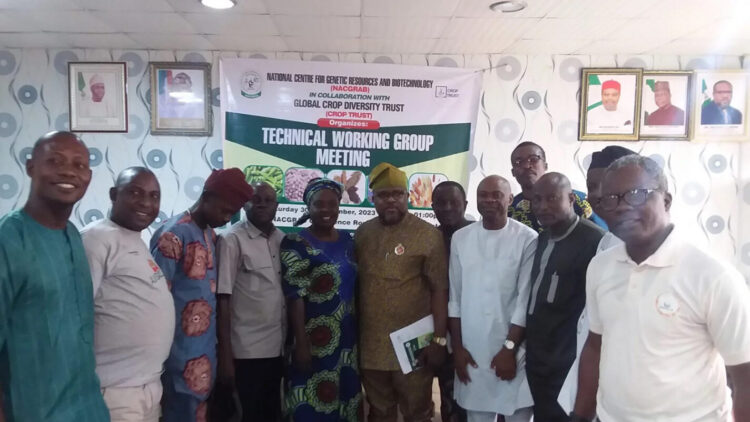The National Centre For Genetic Resources and Biotechnology (NACGRAB), says Nigeria will soon witness sufficiency and price reduction in food commodities.
The NACGRAB Acting Director, Dr Anthony Okere, stated this at the end of a 2023 Technical Working Group (TWG) meeting on Seed For Resilience (SFR) organised by NACGRAB in collaboration with Global Crop Diversity Trust (Crop Trust) in Ibadan.
He said SFR came into existence in 2021 to improve the efficiency of NACGRAB genebank and enhance the use of conserved genepool by farmers and other users of genetic resources in Nigeria.
Okere said the project had exposed the diversity of sorghum, cowpea and other crops to farmers and other users in Nigeria in order to mitigate the effects of climate change and boost farmers’ productivity and ensure food and nutrition security in Nigeria.
He said that the project was successful, based on feedbacks from farmers and other users that the good quality seeds planted this season yielded well in multiples, compared to year 2022.
“Farmers now feeling free to come to NACGRAB genebank to demand more diversity of materials that could help them to get higher production which in turn would lead to food sufficiency and price reduction in Nigeria soon.
“There are availability of quality seeds in NACGRAB genebank that farmers can plant and generate good yield due to success of this project.
” Various farmers can now dwell in more crops instead of one or two crops; this project has made it possible for farmers to plant diversity of quality seeds and generate good yields which in turn will lead to food and nutrition security in Nigeria,” Okere said.
Dr Olabisi Alamu, the Activity Team Leader, User engagement of the project, said that NACGRAB and other stakeholders had been engaging with farmers about the project in the past three years.
Alamu said that farmers in Oyo, Niger and Kano states had been exposed to diversity of seeds of cowpea, sorghum accessions and other seeds conserved in the genebank.
He said that most farmers now had access to the seeds and were now using them to enhance production, increase their yields and income generation.
” In all the three states, we have 49 cluster groups; the Seed for Resilience (SFR) project has impacted over 1,000 farmers over the past three years.
“Some of them have been adopting it as a result of good quality, traits, early maturity varieties, high yields among others,” Alamu said.
The team leader said that some of the farmers had also multiplied the seeds they selected in year 2023 and as well disseminated it to other farmers, to enhance the use of the materials in the genebank.
The Oyo State Chairman of All Farmers Association of Nigeria (AFAN), Mr Abass Adewumi, said the project had exposed them to a lot of things they needed to know and apply on their farms for crops to germinate well.
Adewumi said that the research project had also exposed them to know suitable seeds for planting in certain environment which could give better yields, to maximise profit and shun the old ways of planting seeds.
NAN









